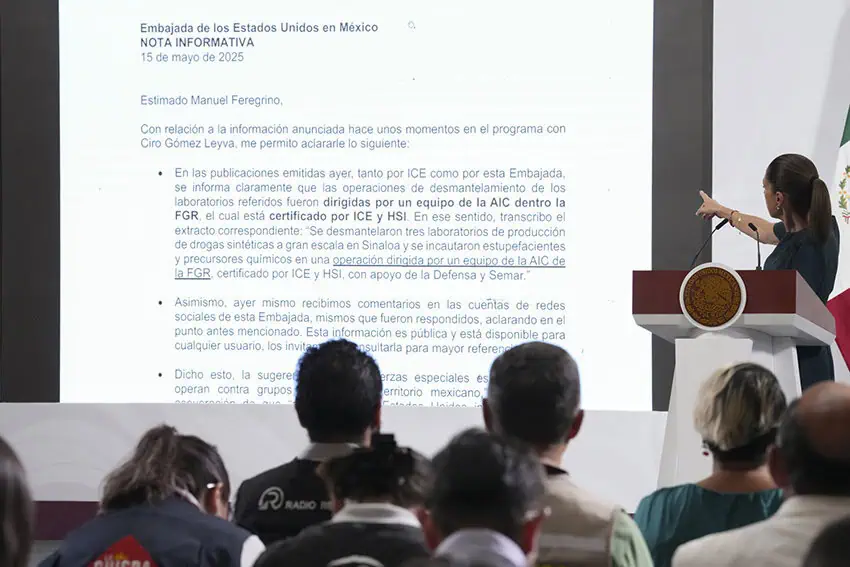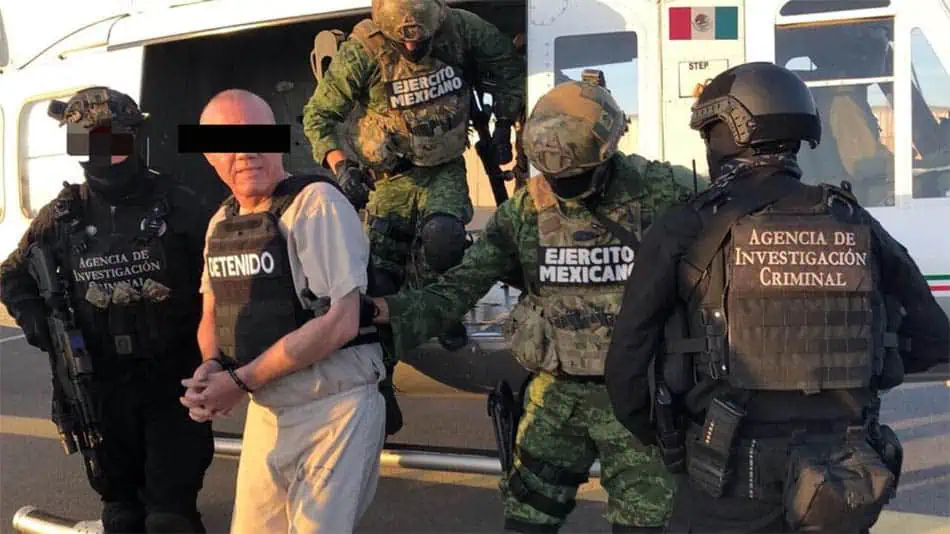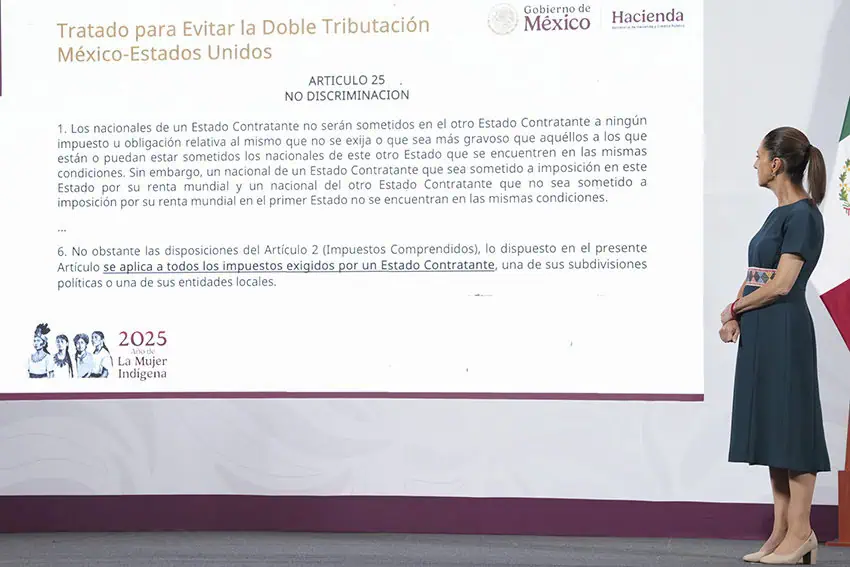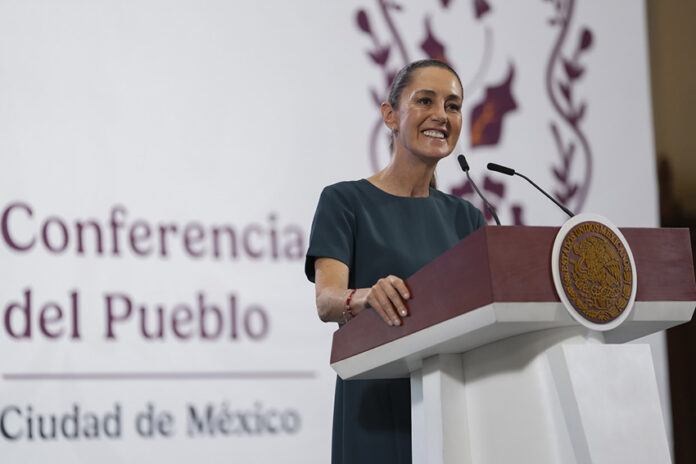At her final morning press conference of the week, President Claudia Sheinbaum spoke about the vetting of Mexican security forces by the U.S. government and media criticism of her administration, among other issues.
Mexico’s first female president also reiterated that her government will always defend the interests of the Mexican people.
Why do United States agencies vet Mexican police?
A reporter asked the president why United States agencies vet “ministerial police” in Mexico.
The question came two days after United States Immigration and Customs Enforcement (ICE) announced that the “ICE Homeland Security Investigations vetted unit” within the Criminal Investigation Agency of the Federal Attorney General’s Office had dismantled “three large-scale synthetic drug production labs in Sinaloa.”
Sheinbaum said that “certification” of Mexican security forces by U.S. authorities is “something that has been around for a long time.”
“… This vetting of the Criminal Investigation Agency … started long before President Andrés Manuel López Obrador,” she said, referring to her predecessor.
Three large-scale synthetic drug production labs in Sinaloa were dismantled with narcotics and chemical precursors seized in an operation led by the ICE Homeland Security Investigations vetted unit within the Government of Mexico, Fiscalia General de la Republica, Agencia de… pic.twitter.com/H9X1fafWbu
— U.S. Immigration and Customs Enforcement (@ICEgov) May 14, 2025
The vetting of Mexican security forces by United States agencies began after Mexico and the U.S. launched the Mérida Initiative security cooperation agreement in 2008. It is essentially an attempt to ensure that Mexican security force members — particularly those who collaborate with and receive intelligence, training and equipment from U.S. authorities — are not corrupt and don’t have links to organized crime groups.
The United States Department of State noted that “activities” under the now-defunct Mérida initiative agreement included “the establishment of anti-corruption programs that include vetting of police personnel.”
The vetting initiative has not always been as successful as the U.S. government would have liked.
According to a 2021 Brookings Institution article, the Mexican government has insisted on “higher-level Mexican officials” being exempt from U.S. vetting. That insistence, Brookings said, created “disastrous effects for collaboration, meaningful law enforcement, and the safety of Mexican civilians.”
Mexico’s “top cop” during the 2006-12 administration of former president Felipe Calderón — ex-security minister Genaro García Luna — was sentenced to 38 years in prison in the United States last October after he was convicted of colluding with the Sinaloa Cartel. García Luna worked closely with U.S. law enforcement authorities during his now heavily tainted tenure as security minister.
Asked on Friday whether Mexico vets any police in the United States, Sheinbaum responded that it does not, but highlighted that Mexican authorities provide “information” to their U.S. counterparts that aid operations on the “other side of the border.”

Mexican intelligence recently led to a seizure of narcotics and firearms in Arizona, she said.
Asked whether she thinks U.S. vetting of Mexican security forces is “good” or something that should be “canceled,” Sheinbaum avoided giving a direct response.
“We’ll have to ask the attorney general what sense this vetting has, and [he] can inform,” she said.
‘Whatever we do, they will criticize us’
A reporter asked the president whether sections of the media had engaged in a “campaign” to “alarm” Mexicans “about a supposed United States intervention” while depicting her administration as a “weak government that doesn’t defend the sovereignty” of Mexico.
The question came after ICE’s social media post announcing the dismantling of drug labs in Sinaloa sparked claims that U.S. agents were involved in the operation in the northern state. Some media outlets initially reported that ICE led the operation when in fact it was led by an ICE-vetted unit of Mexico’s Criminal Investigation Agency (AIC).
Sheinbaum said she didn’t know what the “objective” of some sections of media was with their reporting.

“Whatever we do, they will criticize us,” she said, referring to certain media outlets and individual commentators.
“If I had gone to the funeral events of Pope Francis, they would have criticized me. As I didn’t go, they criticize me as well,” Sheinbaum said.
“They’re [always] going to criticize us because they don’t agree with our government and what we represent,” she said.
‘I don’t represent Claudia Sheinbaum; la presidenta represents her people’
In an extended response to the question about the alleged media scare campaign, Sheinbaum went on to reiterate that her government cooperates and collaborates with the U.S. government, but “doesn’t accept subordination.”
“We have communication with the government of the United States on a lot of issues,” she said, citing the screwworm issue and tariffs as examples.
Sheinbaum said that the “main” bilateral issue her government is currently focused on is the legislative proposal in the United States to impose a 5% tax on remittances sent out of the country by non-citizen immigrants.

The president is vehemently opposed to the imposition of a tax on remittances, part of a massive tax and immigration package whose advance to the U.S. House of Representatives’ floor was blocked on Friday. She is also opposed to a range of other U.S. measures, including the imposition of tariffs on Mexican products and President Donald Trump’s mass deportation initiative.
Nevertheless, Sheinbaum stressed that “our idea is to have the best relationship possible with the United States.”
That relationship, she added, must be “a relationship of respect and not of subordination.”
“… That has been the history of our convictions and it won’t change while I’m president of the republic, never,” Sheinbaum said.
“Besides, we represent the people of Mexico. I don’t represent Claudia Sheinbaum; la presidenta represents her people and we will always defend the people of Mexico, the nation and the homeland,” she said.
By Mexico News Daily chief staff writer Peter Davies ([email protected])
